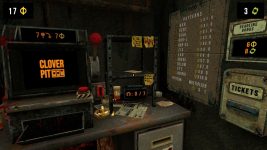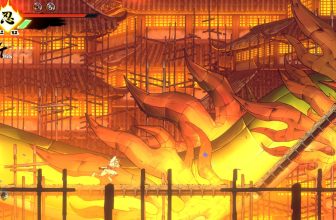
Steam’s Latest Hit Is A Creepy, Murderous Slot Machine
In the wake of the phenomenal success of Balatro, we are going to be treated to all manner of gambling-adjacent roguelites. And bring them on, I say! Coming soon we have picture-pairs deckbuilder Replicat, another cat-themed game in Mahjong-based roguelite Feng Shui: Meowjong, and deckbuilding-meets-slot-machine-meets-rune-matching game Runeborn (which is out next week). One of the first to reach us, however, is CloverPit, a slot-machine-themed game that takes the inherent sadness of plunging all your money into a cold, indifferent machine to a grim, deadly place. And it’s very tough to stop playing.
There’s something fundamentally sad about a slot machine. First and foremost, because they’re the grimmest form of gambling: there’s no skill involved at all because every single machine is fixed, paying out when its programming tells it to, and designed to always take in far more than it ever gives. There’s also something unpleasantly ironic about their bright, cheerful presentation, colorful fruits and gems spinning around as a hundred colored lights flash on and off in enticing patterns, all designed to take your money. It’s within this contradiction that CloverPit makes its home, presenting its rotating fruits and treasures on a dilapidated machine, complete with a very concerning blood stain on one corner, and put inside a small, grimy cell-like room. Oh, and if you don’t win enough money, you die.
There’s a demonic nature to all the proceedings, the game’s dirty pixel graphics reminiscent of 2021’s horror card game Inscryption (one of a number of games with which it can be bought in a two-game bundle), and a subtitled narrator mockingly explaining your predicament. You need to make a fixed number of coins within three rounds of playing on the slot machine, and if you fall short the floor opens up beneath you and you fall to your death. Should you succeed, the target goes up for what it calls a new Deadline, and three more rounds begin.

Of course there’s a lot more to it than that. Through playing you not only win coins, but also tickets, and these can be used to buy “lucky charms” from a small cabinet behind you. The randomly selected items (chosen from an ever-growing number that are unlocked through reaching certain milestones as you play, one of which involves going for a shit in the room’s filthy toilet) add detailed bonuses, like giving more value to certain symbols or causing other symbols to appear more often, or perhaps randomly triggering the chance for an extra spin in a round. The more you play, the more complicated these bonuses can be, like Fortune Teller’s “25% chance for the chain modifier to be applied to any symbol, decreased by 5% at the end of every round,” where chain modifiers improve the value of particular patterns formed by matching symbols on the three-by-five slot machine display…Like I said, it gets complicated.
Another crucial element is that for each round, you can choose to play three spins and receive two tickets at the end, or play seven spins and get only one ticket. That imbalance is perfect, forcing you to significantly sacrifice winnings to unlock a more expensive Charm, or risk not getting more bonuses and just going to spins. On top of this, between each Deadline a dirty, red phone will ring, Deal or No Deal-style, and you’re offered the choice of one of three buffs or debuffs. Oh, and there are drawers you can unlock, and there’s a little computer that stores data on all the Charms you’ve unlocked, and the requirements for those you’ve not. It’s an impressive amount to pack into one tiny little prison.

Perhaps CloverPit‘s greatest advantage is that, just like in real life, those one-armed bandits are compelling machines. There’s a reason we have the cliche of the tragic, hunched figure, feeding coin after coin into the Las Vegas slot machine at 3 a.m. Just pulling the virtual arm in the game and seeing the symbols spin around is enticing. And like real fruit machines, the results are very fixed. Your “luck” is a measurable metric in the game, boosted by Charms, increasing the likelihood of high-scoring patterns of cherries and lemons appearing. This, as it happens, is also the game’s greatest weakness.
The comparisons with Balatro are very much invited when the game can be bought bundled with it. But while Balatro‘s poker-themed rogue-ish ways certainly involve a great deal of luck, there’s also an enormous amount of skill involved in shaping a good run from the elements thrown at you. This definitely feels less the case in CloverPit in which, despite the intricacies of the available Lucky Charms and the enormous bonuses available should you wisely combine the attributes of those which work well together, it still always feels far too much like your chance of completing a Deadline can come down to whether the game decides to throw a super-successful spin your way. While you can improve your luck, you can’t purposefully bring on a “jackpot” where every single symbol matches, and you’re pretty certain to earn enough cash.
It’s also the case that the Charms don’t add anywhere near as much variety to a run as the dozens of different ways you can approach a run at Balatro. This game lacks that sense of, “Oh, I reckon this should be a three-of-a-kind run,” based on your early jokers and planet cards. Instead, you just sort of play the best of what you get, and hope it works out. When it doesn’t, you die and start over.

The important thing is that starting over remains very compelling. It’s a fast game, nippily speeding through its various elements, meaning you’re never left frustrated by a bad predicament. And of course, the more you play, the more becomes revealed, like what those drawers are for and why, when you put a Charm inside one in one run, it’s replaced by a severed piece of a corpse in the next. Yeah, that’s a thing.
That creepiness adds a lot to CloverPit, with the overriding questions of why exactly you’re being tortured in a disgusting pit with a murderous slot machine always haunting you. It’s splendid how just about every element feels wrong. I mean, I completely forgot to mention the flies buzzing around the bin of what I think might be meat that sits below the slot machine itself.
So while this doesn’t manage to survive a comparison with the titan that is Balatro, it’s also the case that no one ever said it should have to. Though I’d love to feel a bit more autonomy over my chances of success, this is ultimately a game about the unfairness of a slot machine that’ll make you want to experience it over and over and over.






